Clinical Leadership in Mental Health Nursing: Article Review Analysis
VerifiedAdded on 2022/10/19
|10
|2010
|467
Report
AI Summary
This report provides a comprehensive review of the article "Clinical Leadership in Mental Health Nursing: The Importance of a Calm and Confident Approach." The article explores the crucial role of clinical leadership in enhancing patient health outcomes within mental health settings. The research, employing a descriptive qualitative design and content analysis, highlights nurses' perspectives on effective clinical leadership, emphasizing the importance of a calm and confident demeanor in managing complex situations, including acute psychotic symptoms and behavioral disturbances. The findings underscore the significance of clinical leaders in improving decision-making processes, fostering positive environments, and motivating nurses. The review discusses the methods, including interviews with registered nurses, ethical considerations, and limitations of the study, such as sample size. The conclusion emphasizes the potential of clinical leadership to reduce complexity and manage critical situations, offering insights into the practical implications for nursing practice and therapeutic alliances with patients.
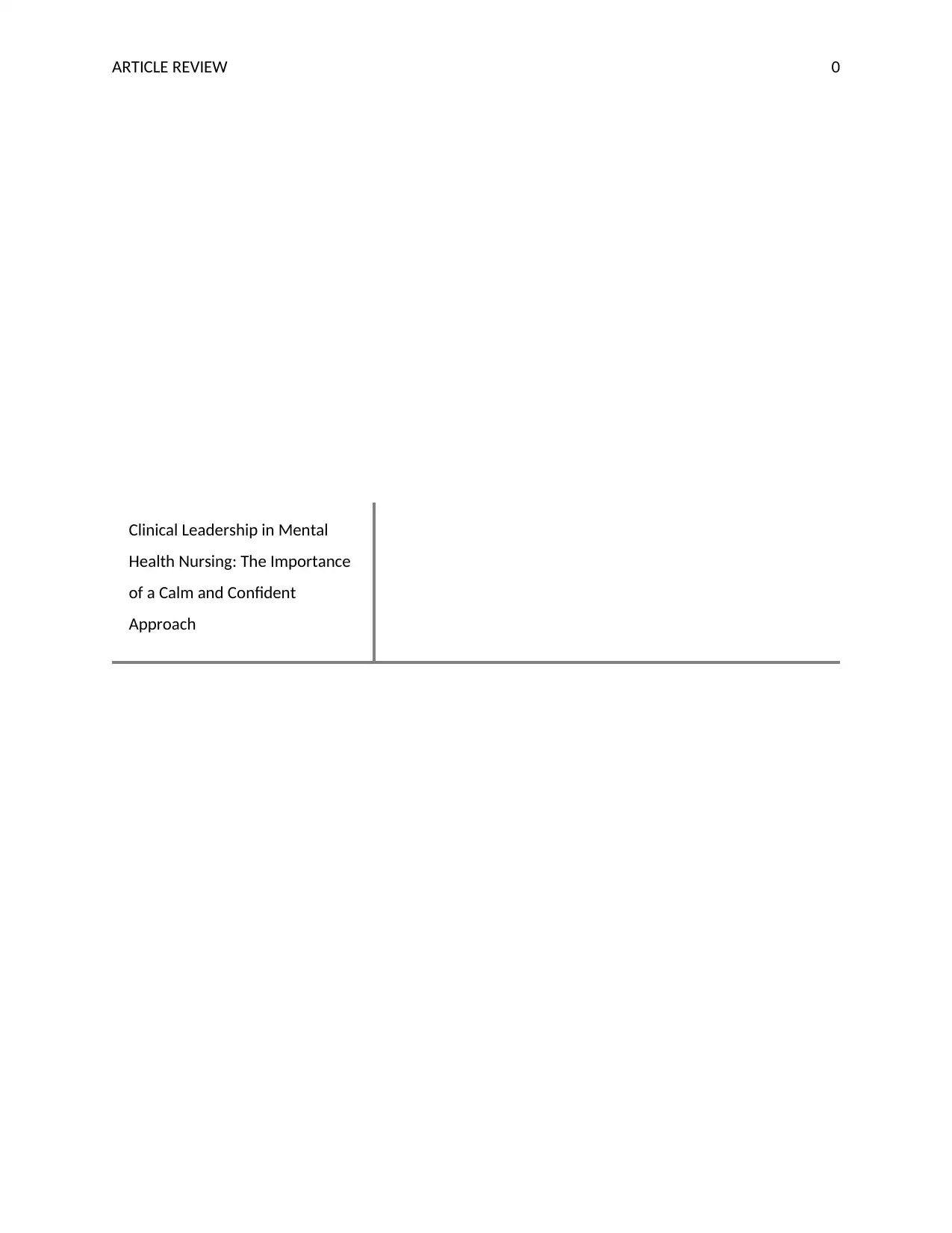
ARTICLE REVIEW 0
Clinical Leadership in Mental
Health Nursing: The Importance
of a Calm and Confident
Approach
Clinical Leadership in Mental
Health Nursing: The Importance
of a Calm and Confident
Approach
Paraphrase This Document
Need a fresh take? Get an instant paraphrase of this document with our AI Paraphraser
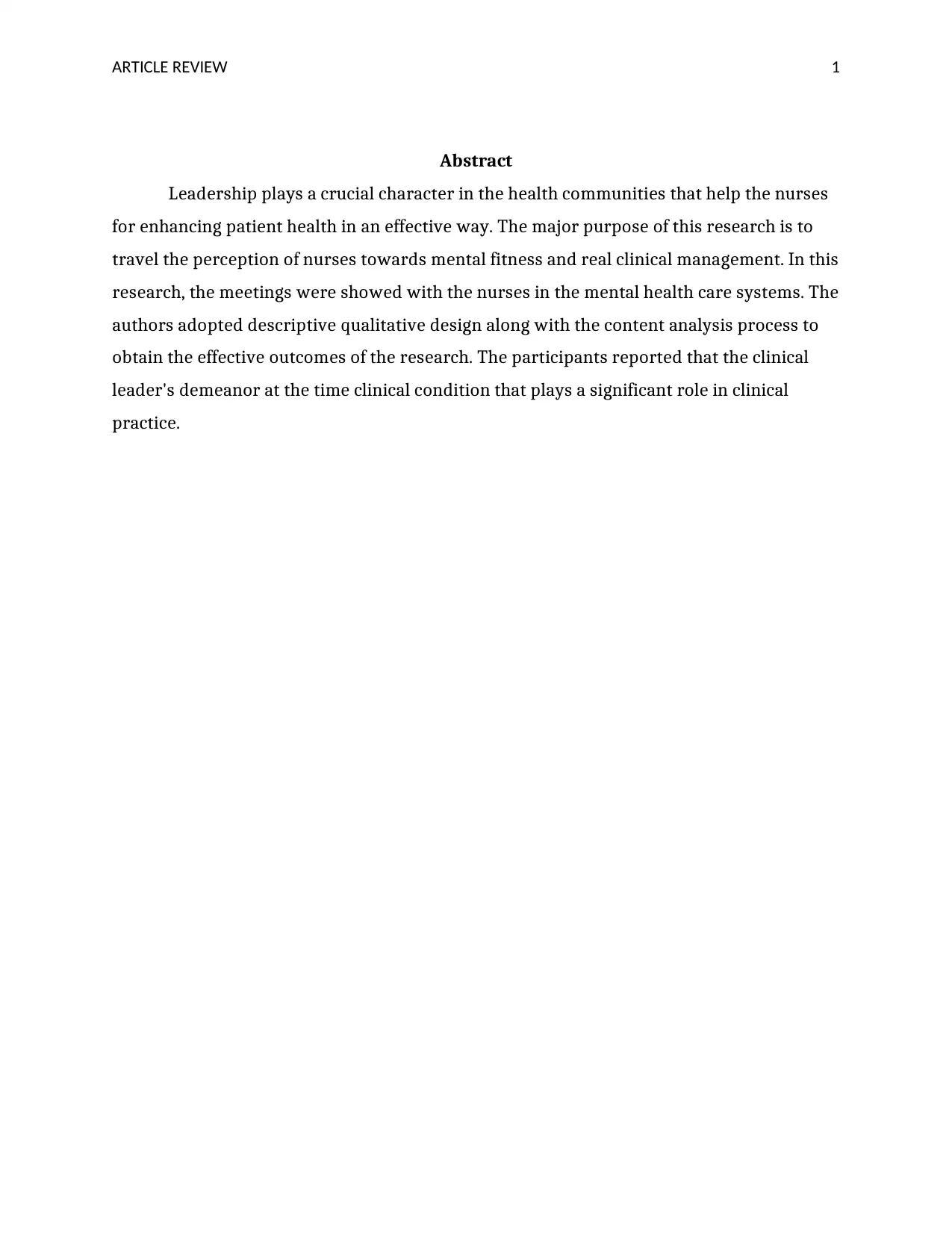
ARTICLE REVIEW 1
Abstract
Leadership plays a crucial character in the health communities that help the nurses
for enhancing patient health in an effective way. The major purpose of this research is to
travel the perception of nurses towards mental fitness and real clinical management. In this
research, the meetings were showed with the nurses in the mental health care systems. The
authors adopted descriptive qualitative design along with the content analysis process to
obtain the effective outcomes of the research. The participants reported that the clinical
leader's demeanor at the time clinical condition that plays a significant role in clinical
practice.
Abstract
Leadership plays a crucial character in the health communities that help the nurses
for enhancing patient health in an effective way. The major purpose of this research is to
travel the perception of nurses towards mental fitness and real clinical management. In this
research, the meetings were showed with the nurses in the mental health care systems. The
authors adopted descriptive qualitative design along with the content analysis process to
obtain the effective outcomes of the research. The participants reported that the clinical
leader's demeanor at the time clinical condition that plays a significant role in clinical
practice.
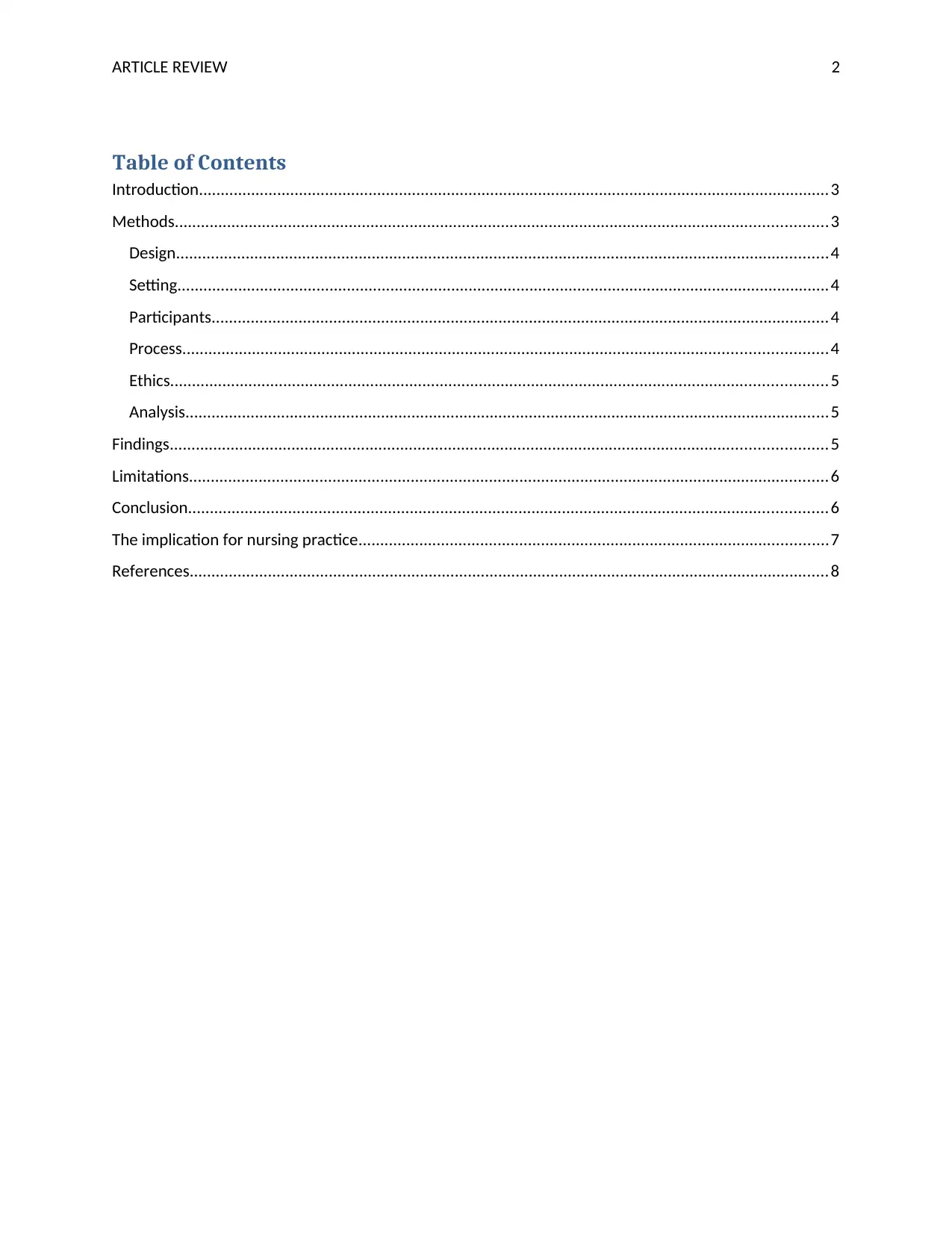
ARTICLE REVIEW 2
Table of Contents
Introduction.................................................................................................................................................3
Methods......................................................................................................................................................3
Design......................................................................................................................................................4
Setting......................................................................................................................................................4
Participants..............................................................................................................................................4
Process....................................................................................................................................................4
Ethics.......................................................................................................................................................5
Analysis....................................................................................................................................................5
Findings.......................................................................................................................................................5
Limitations...................................................................................................................................................6
Conclusion...................................................................................................................................................6
The implication for nursing practice............................................................................................................7
References...................................................................................................................................................8
Table of Contents
Introduction.................................................................................................................................................3
Methods......................................................................................................................................................3
Design......................................................................................................................................................4
Setting......................................................................................................................................................4
Participants..............................................................................................................................................4
Process....................................................................................................................................................4
Ethics.......................................................................................................................................................5
Analysis....................................................................................................................................................5
Findings.......................................................................................................................................................5
Limitations...................................................................................................................................................6
Conclusion...................................................................................................................................................6
The implication for nursing practice............................................................................................................7
References...................................................................................................................................................8
⊘ This is a preview!⊘
Do you want full access?
Subscribe today to unlock all pages.

Trusted by 1+ million students worldwide
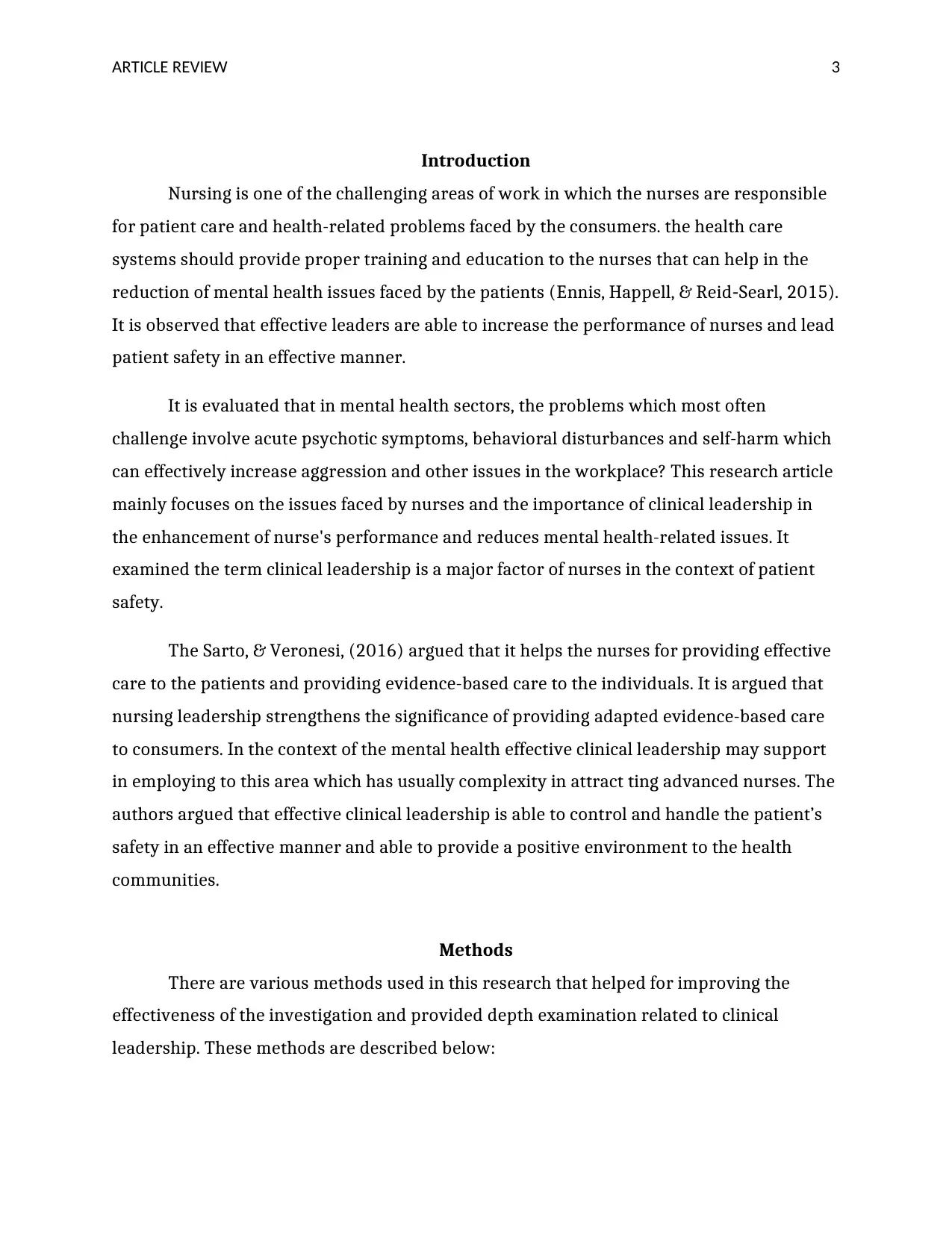
ARTICLE REVIEW 3
Introduction
Nursing is one of the challenging areas of work in which the nurses are responsible
for patient care and health-related problems faced by the consumers. the health care
systems should provide proper training and education to the nurses that can help in the
reduction of mental health issues faced by the patients (Ennis, Happell, & Reid‐Searl, 2015).
It is observed that effective leaders are able to increase the performance of nurses and lead
patient safety in an effective manner.
It is evaluated that in mental health sectors, the problems which most often
challenge involve acute psychotic symptoms, behavioral disturbances and self-harm which
can effectively increase aggression and other issues in the workplace? This research article
mainly focuses on the issues faced by nurses and the importance of clinical leadership in
the enhancement of nurse's performance and reduces mental health-related issues. It
examined the term clinical leadership is a major factor of nurses in the context of patient
safety.
The Sarto, & Veronesi, (2016) argued that it helps the nurses for providing effective
care to the patients and providing evidence-based care to the individuals. It is argued that
nursing leadership strengthens the significance of providing adapted evidence-based care
to consumers. In the context of the mental health effective clinical leadership may support
in employing to this area which has usually complexity in attract ting advanced nurses. The
authors argued that effective clinical leadership is able to control and handle the patient’s
safety in an effective manner and able to provide a positive environment to the health
communities.
Methods
There are various methods used in this research that helped for improving the
effectiveness of the investigation and provided depth examination related to clinical
leadership. These methods are described below:
Introduction
Nursing is one of the challenging areas of work in which the nurses are responsible
for patient care and health-related problems faced by the consumers. the health care
systems should provide proper training and education to the nurses that can help in the
reduction of mental health issues faced by the patients (Ennis, Happell, & Reid‐Searl, 2015).
It is observed that effective leaders are able to increase the performance of nurses and lead
patient safety in an effective manner.
It is evaluated that in mental health sectors, the problems which most often
challenge involve acute psychotic symptoms, behavioral disturbances and self-harm which
can effectively increase aggression and other issues in the workplace? This research article
mainly focuses on the issues faced by nurses and the importance of clinical leadership in
the enhancement of nurse's performance and reduces mental health-related issues. It
examined the term clinical leadership is a major factor of nurses in the context of patient
safety.
The Sarto, & Veronesi, (2016) argued that it helps the nurses for providing effective
care to the patients and providing evidence-based care to the individuals. It is argued that
nursing leadership strengthens the significance of providing adapted evidence-based care
to consumers. In the context of the mental health effective clinical leadership may support
in employing to this area which has usually complexity in attract ting advanced nurses. The
authors argued that effective clinical leadership is able to control and handle the patient’s
safety in an effective manner and able to provide a positive environment to the health
communities.
Methods
There are various methods used in this research that helped for improving the
effectiveness of the investigation and provided depth examination related to clinical
leadership. These methods are described below:
Paraphrase This Document
Need a fresh take? Get an instant paraphrase of this document with our AI Paraphraser
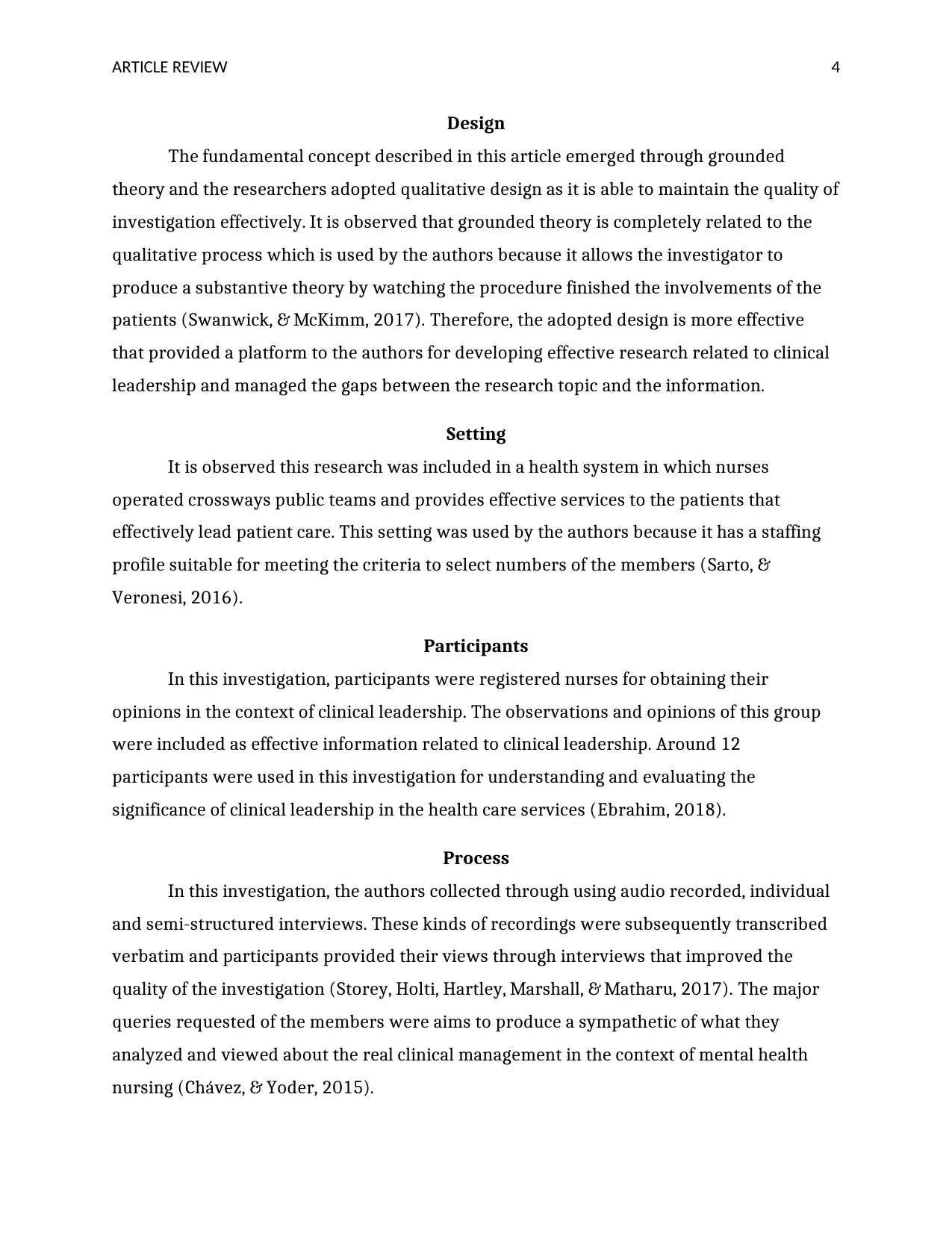
ARTICLE REVIEW 4
Design
The fundamental concept described in this article emerged through grounded
theory and the researchers adopted qualitative design as it is able to maintain the quality of
investigation effectively. It is observed that grounded theory is completely related to the
qualitative process which is used by the authors because it allows the investigator to
produce a substantive theory by watching the procedure finished the involvements of the
patients (Swanwick, & McKimm, 2017). Therefore, the adopted design is more effective
that provided a platform to the authors for developing effective research related to clinical
leadership and managed the gaps between the research topic and the information.
Setting
It is observed this research was included in a health system in which nurses
operated crossways public teams and provides effective services to the patients that
effectively lead patient care. This setting was used by the authors because it has a staffing
profile suitable for meeting the criteria to select numbers of the members (Sarto, &
Veronesi, 2016).
Participants
In this investigation, participants were registered nurses for obtaining their
opinions in the context of clinical leadership. The observations and opinions of this group
were included as effective information related to clinical leadership. Around 12
participants were used in this investigation for understanding and evaluating the
significance of clinical leadership in the health care services (Ebrahim, 2018).
Process
In this investigation, the authors collected through using audio recorded, individual
and semi-structured interviews. These kinds of recordings were subsequently transcribed
verbatim and participants provided their views through interviews that improved the
quality of the investigation (Storey, Holti, Hartley, Marshall, & Matharu, 2017). The major
queries requested of the members were aims to produce a sympathetic of what they
analyzed and viewed about the real clinical management in the context of mental health
nursing (Chávez, & Yoder, 2015).
Design
The fundamental concept described in this article emerged through grounded
theory and the researchers adopted qualitative design as it is able to maintain the quality of
investigation effectively. It is observed that grounded theory is completely related to the
qualitative process which is used by the authors because it allows the investigator to
produce a substantive theory by watching the procedure finished the involvements of the
patients (Swanwick, & McKimm, 2017). Therefore, the adopted design is more effective
that provided a platform to the authors for developing effective research related to clinical
leadership and managed the gaps between the research topic and the information.
Setting
It is observed this research was included in a health system in which nurses
operated crossways public teams and provides effective services to the patients that
effectively lead patient care. This setting was used by the authors because it has a staffing
profile suitable for meeting the criteria to select numbers of the members (Sarto, &
Veronesi, 2016).
Participants
In this investigation, participants were registered nurses for obtaining their
opinions in the context of clinical leadership. The observations and opinions of this group
were included as effective information related to clinical leadership. Around 12
participants were used in this investigation for understanding and evaluating the
significance of clinical leadership in the health care services (Ebrahim, 2018).
Process
In this investigation, the authors collected through using audio recorded, individual
and semi-structured interviews. These kinds of recordings were subsequently transcribed
verbatim and participants provided their views through interviews that improved the
quality of the investigation (Storey, Holti, Hartley, Marshall, & Matharu, 2017). The major
queries requested of the members were aims to produce a sympathetic of what they
analyzed and viewed about the real clinical management in the context of mental health
nursing (Chávez, & Yoder, 2015).
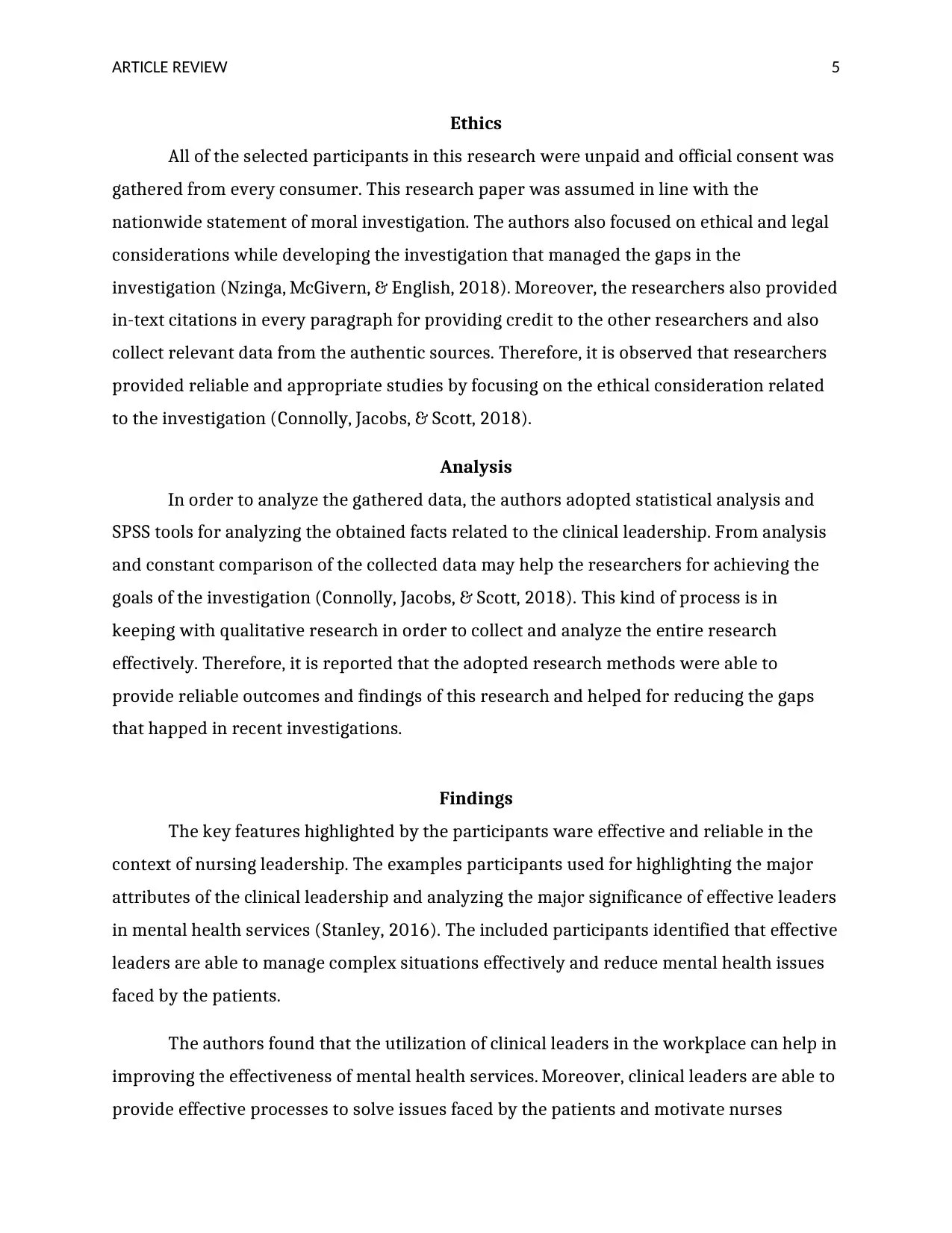
ARTICLE REVIEW 5
Ethics
All of the selected participants in this research were unpaid and official consent was
gathered from every consumer. This research paper was assumed in line with the
nationwide statement of moral investigation. The authors also focused on ethical and legal
considerations while developing the investigation that managed the gaps in the
investigation (Nzinga, McGivern, & English, 2018). Moreover, the researchers also provided
in-text citations in every paragraph for providing credit to the other researchers and also
collect relevant data from the authentic sources. Therefore, it is observed that researchers
provided reliable and appropriate studies by focusing on the ethical consideration related
to the investigation (Connolly, Jacobs, & Scott, 2018).
Analysis
In order to analyze the gathered data, the authors adopted statistical analysis and
SPSS tools for analyzing the obtained facts related to the clinical leadership. From analysis
and constant comparison of the collected data may help the researchers for achieving the
goals of the investigation (Connolly, Jacobs, & Scott, 2018). This kind of process is in
keeping with qualitative research in order to collect and analyze the entire research
effectively. Therefore, it is reported that the adopted research methods were able to
provide reliable outcomes and findings of this research and helped for reducing the gaps
that happed in recent investigations.
Findings
The key features highlighted by the participants ware effective and reliable in the
context of nursing leadership. The examples participants used for highlighting the major
attributes of the clinical leadership and analyzing the major significance of effective leaders
in mental health services (Stanley, 2016). The included participants identified that effective
leaders are able to manage complex situations effectively and reduce mental health issues
faced by the patients.
The authors found that the utilization of clinical leaders in the workplace can help in
improving the effectiveness of mental health services. Moreover, clinical leaders are able to
provide effective processes to solve issues faced by the patients and motivate nurses
Ethics
All of the selected participants in this research were unpaid and official consent was
gathered from every consumer. This research paper was assumed in line with the
nationwide statement of moral investigation. The authors also focused on ethical and legal
considerations while developing the investigation that managed the gaps in the
investigation (Nzinga, McGivern, & English, 2018). Moreover, the researchers also provided
in-text citations in every paragraph for providing credit to the other researchers and also
collect relevant data from the authentic sources. Therefore, it is observed that researchers
provided reliable and appropriate studies by focusing on the ethical consideration related
to the investigation (Connolly, Jacobs, & Scott, 2018).
Analysis
In order to analyze the gathered data, the authors adopted statistical analysis and
SPSS tools for analyzing the obtained facts related to the clinical leadership. From analysis
and constant comparison of the collected data may help the researchers for achieving the
goals of the investigation (Connolly, Jacobs, & Scott, 2018). This kind of process is in
keeping with qualitative research in order to collect and analyze the entire research
effectively. Therefore, it is reported that the adopted research methods were able to
provide reliable outcomes and findings of this research and helped for reducing the gaps
that happed in recent investigations.
Findings
The key features highlighted by the participants ware effective and reliable in the
context of nursing leadership. The examples participants used for highlighting the major
attributes of the clinical leadership and analyzing the major significance of effective leaders
in mental health services (Stanley, 2016). The included participants identified that effective
leaders are able to manage complex situations effectively and reduce mental health issues
faced by the patients.
The authors found that the utilization of clinical leaders in the workplace can help in
improving the effectiveness of mental health services. Moreover, clinical leaders are able to
provide effective processes to solve issues faced by the patients and motivate nurses
⊘ This is a preview!⊘
Do you want full access?
Subscribe today to unlock all pages.

Trusted by 1+ million students worldwide
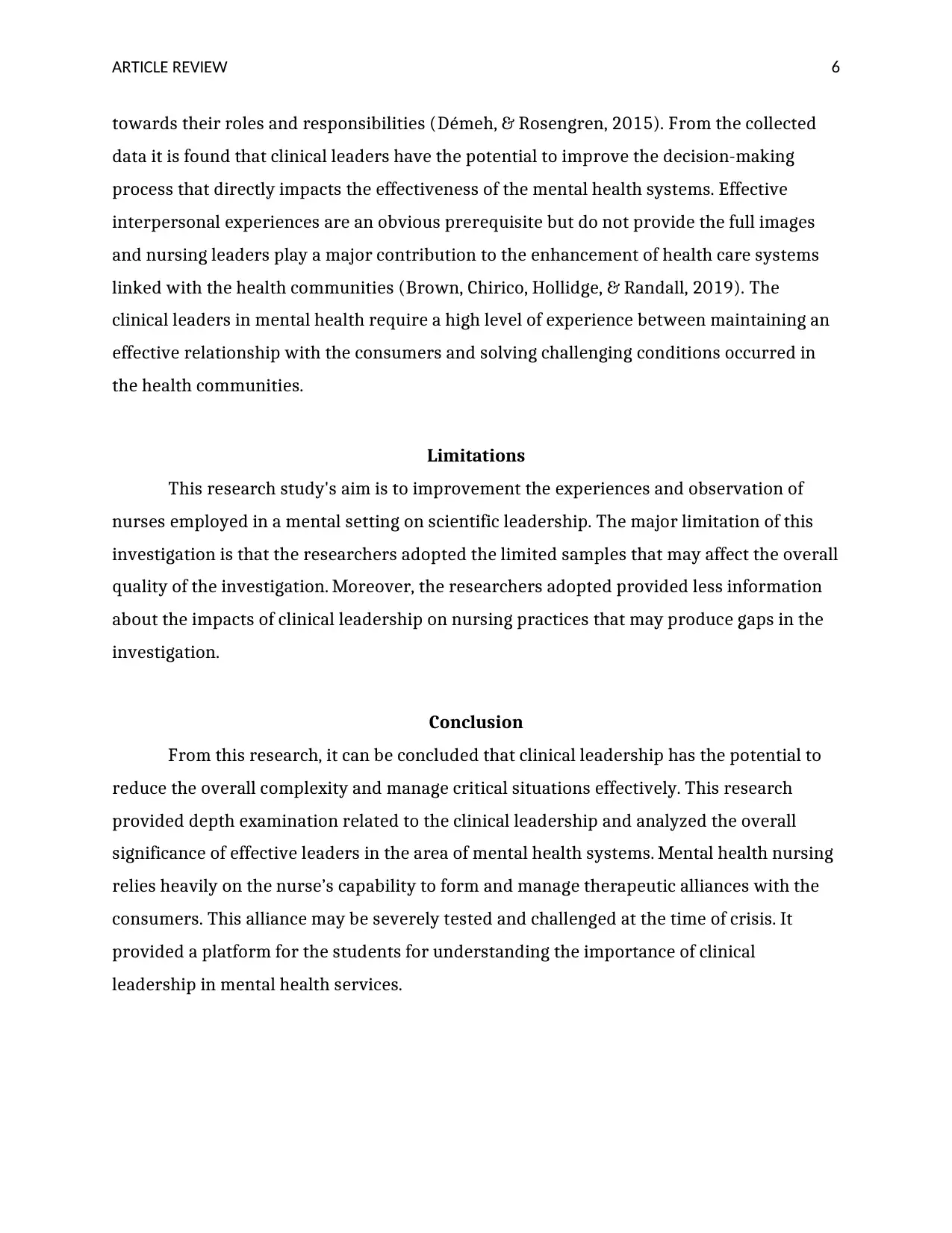
ARTICLE REVIEW 6
towards their roles and responsibilities (Démeh, & Rosengren, 2015). From the collected
data it is found that clinical leaders have the potential to improve the decision-making
process that directly impacts the effectiveness of the mental health systems. Effective
interpersonal experiences are an obvious prerequisite but do not provide the full images
and nursing leaders play a major contribution to the enhancement of health care systems
linked with the health communities (Brown, Chirico, Hollidge, & Randall, 2019). The
clinical leaders in mental health require a high level of experience between maintaining an
effective relationship with the consumers and solving challenging conditions occurred in
the health communities.
Limitations
This research study's aim is to improvement the experiences and observation of
nurses employed in a mental setting on scientific leadership. The major limitation of this
investigation is that the researchers adopted the limited samples that may affect the overall
quality of the investigation. Moreover, the researchers adopted provided less information
about the impacts of clinical leadership on nursing practices that may produce gaps in the
investigation.
Conclusion
From this research, it can be concluded that clinical leadership has the potential to
reduce the overall complexity and manage critical situations effectively. This research
provided depth examination related to the clinical leadership and analyzed the overall
significance of effective leaders in the area of mental health systems. Mental health nursing
relies heavily on the nurse’s capability to form and manage therapeutic alliances with the
consumers. This alliance may be severely tested and challenged at the time of crisis. It
provided a platform for the students for understanding the importance of clinical
leadership in mental health services.
towards their roles and responsibilities (Démeh, & Rosengren, 2015). From the collected
data it is found that clinical leaders have the potential to improve the decision-making
process that directly impacts the effectiveness of the mental health systems. Effective
interpersonal experiences are an obvious prerequisite but do not provide the full images
and nursing leaders play a major contribution to the enhancement of health care systems
linked with the health communities (Brown, Chirico, Hollidge, & Randall, 2019). The
clinical leaders in mental health require a high level of experience between maintaining an
effective relationship with the consumers and solving challenging conditions occurred in
the health communities.
Limitations
This research study's aim is to improvement the experiences and observation of
nurses employed in a mental setting on scientific leadership. The major limitation of this
investigation is that the researchers adopted the limited samples that may affect the overall
quality of the investigation. Moreover, the researchers adopted provided less information
about the impacts of clinical leadership on nursing practices that may produce gaps in the
investigation.
Conclusion
From this research, it can be concluded that clinical leadership has the potential to
reduce the overall complexity and manage critical situations effectively. This research
provided depth examination related to the clinical leadership and analyzed the overall
significance of effective leaders in the area of mental health systems. Mental health nursing
relies heavily on the nurse’s capability to form and manage therapeutic alliances with the
consumers. This alliance may be severely tested and challenged at the time of crisis. It
provided a platform for the students for understanding the importance of clinical
leadership in mental health services.
Paraphrase This Document
Need a fresh take? Get an instant paraphrase of this document with our AI Paraphraser
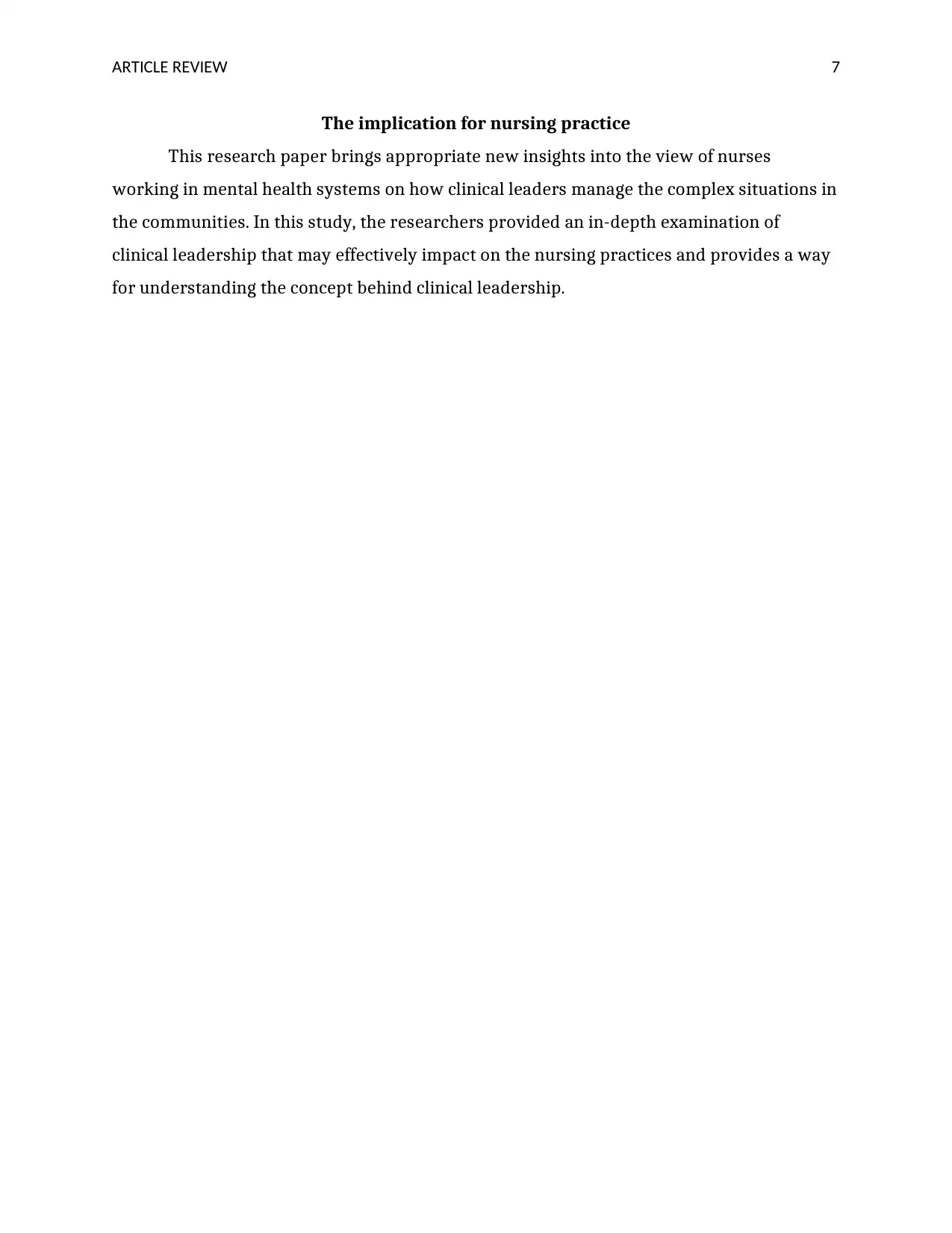
ARTICLE REVIEW 7
The implication for nursing practice
This research paper brings appropriate new insights into the view of nurses
working in mental health systems on how clinical leaders manage the complex situations in
the communities. In this study, the researchers provided an in-depth examination of
clinical leadership that may effectively impact on the nursing practices and provides a way
for understanding the concept behind clinical leadership.
The implication for nursing practice
This research paper brings appropriate new insights into the view of nurses
working in mental health systems on how clinical leaders manage the complex situations in
the communities. In this study, the researchers provided an in-depth examination of
clinical leadership that may effectively impact on the nursing practices and provides a way
for understanding the concept behind clinical leadership.
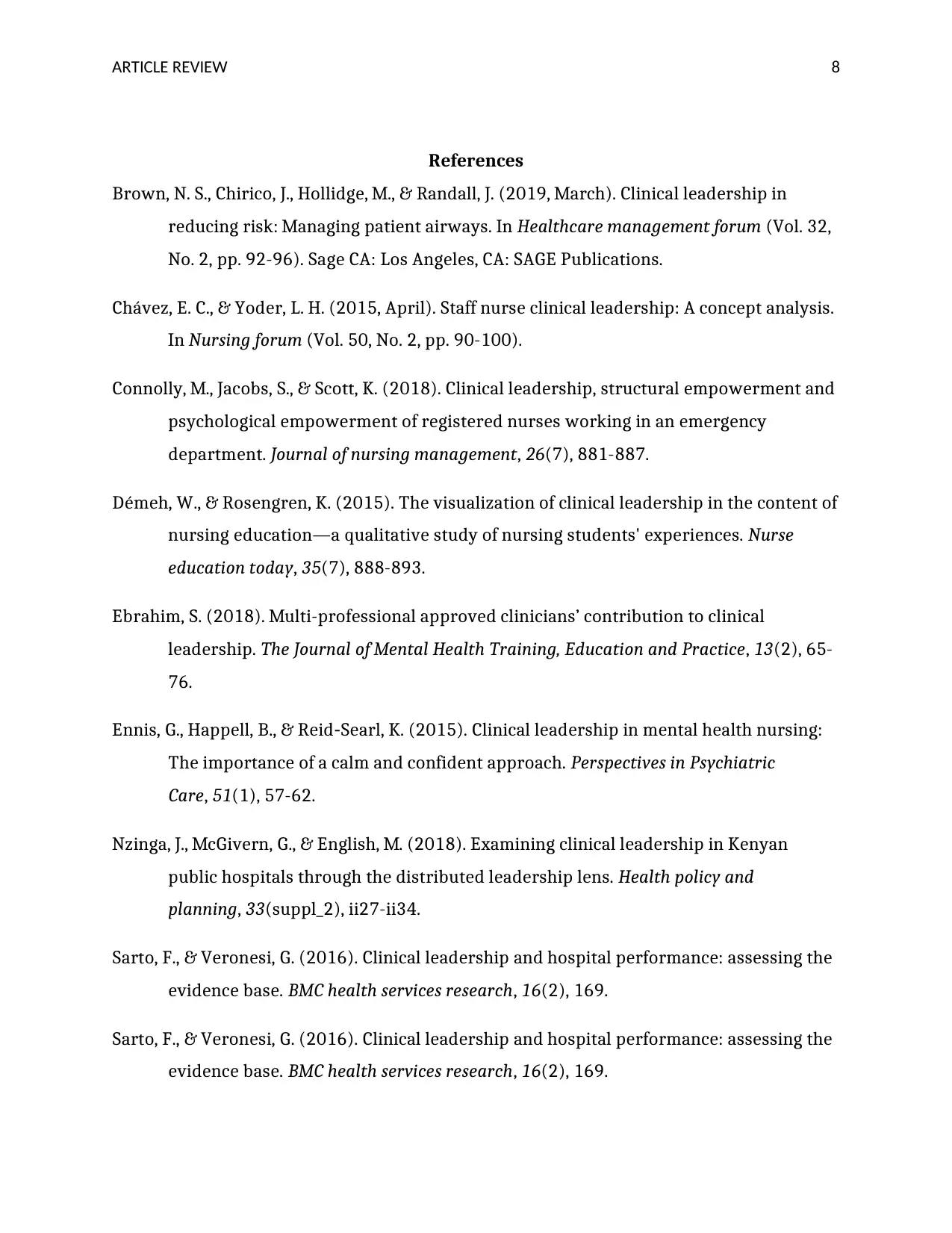
ARTICLE REVIEW 8
References
Brown, N. S., Chirico, J., Hollidge, M., & Randall, J. (2019, March). Clinical leadership in
reducing risk: Managing patient airways. In Healthcare management forum (Vol. 32,
No. 2, pp. 92-96). Sage CA: Los Angeles, CA: SAGE Publications.
Chávez, E. C., & Yoder, L. H. (2015, April). Staff nurse clinical leadership: A concept analysis.
In Nursing forum (Vol. 50, No. 2, pp. 90-100).
Connolly, M., Jacobs, S., & Scott, K. (2018). Clinical leadership, structural empowerment and
psychological empowerment of registered nurses working in an emergency
department. Journal of nursing management, 26(7), 881-887.
Démeh, W., & Rosengren, K. (2015). The visualization of clinical leadership in the content of
nursing education—a qualitative study of nursing students' experiences. Nurse
education today, 35(7), 888-893.
Ebrahim, S. (2018). Multi-professional approved clinicians’ contribution to clinical
leadership. The Journal of Mental Health Training, Education and Practice, 13(2), 65-
76.
Ennis, G., Happell, B., & Reid‐Searl, K. (2015). Clinical leadership in mental health nursing:
The importance of a calm and confident approach. Perspectives in Psychiatric
Care, 51(1), 57-62.
Nzinga, J., McGivern, G., & English, M. (2018). Examining clinical leadership in Kenyan
public hospitals through the distributed leadership lens. Health policy and
planning, 33(suppl_2), ii27-ii34.
Sarto, F., & Veronesi, G. (2016). Clinical leadership and hospital performance: assessing the
evidence base. BMC health services research, 16(2), 169.
Sarto, F., & Veronesi, G. (2016). Clinical leadership and hospital performance: assessing the
evidence base. BMC health services research, 16(2), 169.
References
Brown, N. S., Chirico, J., Hollidge, M., & Randall, J. (2019, March). Clinical leadership in
reducing risk: Managing patient airways. In Healthcare management forum (Vol. 32,
No. 2, pp. 92-96). Sage CA: Los Angeles, CA: SAGE Publications.
Chávez, E. C., & Yoder, L. H. (2015, April). Staff nurse clinical leadership: A concept analysis.
In Nursing forum (Vol. 50, No. 2, pp. 90-100).
Connolly, M., Jacobs, S., & Scott, K. (2018). Clinical leadership, structural empowerment and
psychological empowerment of registered nurses working in an emergency
department. Journal of nursing management, 26(7), 881-887.
Démeh, W., & Rosengren, K. (2015). The visualization of clinical leadership in the content of
nursing education—a qualitative study of nursing students' experiences. Nurse
education today, 35(7), 888-893.
Ebrahim, S. (2018). Multi-professional approved clinicians’ contribution to clinical
leadership. The Journal of Mental Health Training, Education and Practice, 13(2), 65-
76.
Ennis, G., Happell, B., & Reid‐Searl, K. (2015). Clinical leadership in mental health nursing:
The importance of a calm and confident approach. Perspectives in Psychiatric
Care, 51(1), 57-62.
Nzinga, J., McGivern, G., & English, M. (2018). Examining clinical leadership in Kenyan
public hospitals through the distributed leadership lens. Health policy and
planning, 33(suppl_2), ii27-ii34.
Sarto, F., & Veronesi, G. (2016). Clinical leadership and hospital performance: assessing the
evidence base. BMC health services research, 16(2), 169.
Sarto, F., & Veronesi, G. (2016). Clinical leadership and hospital performance: assessing the
evidence base. BMC health services research, 16(2), 169.
⊘ This is a preview!⊘
Do you want full access?
Subscribe today to unlock all pages.

Trusted by 1+ million students worldwide
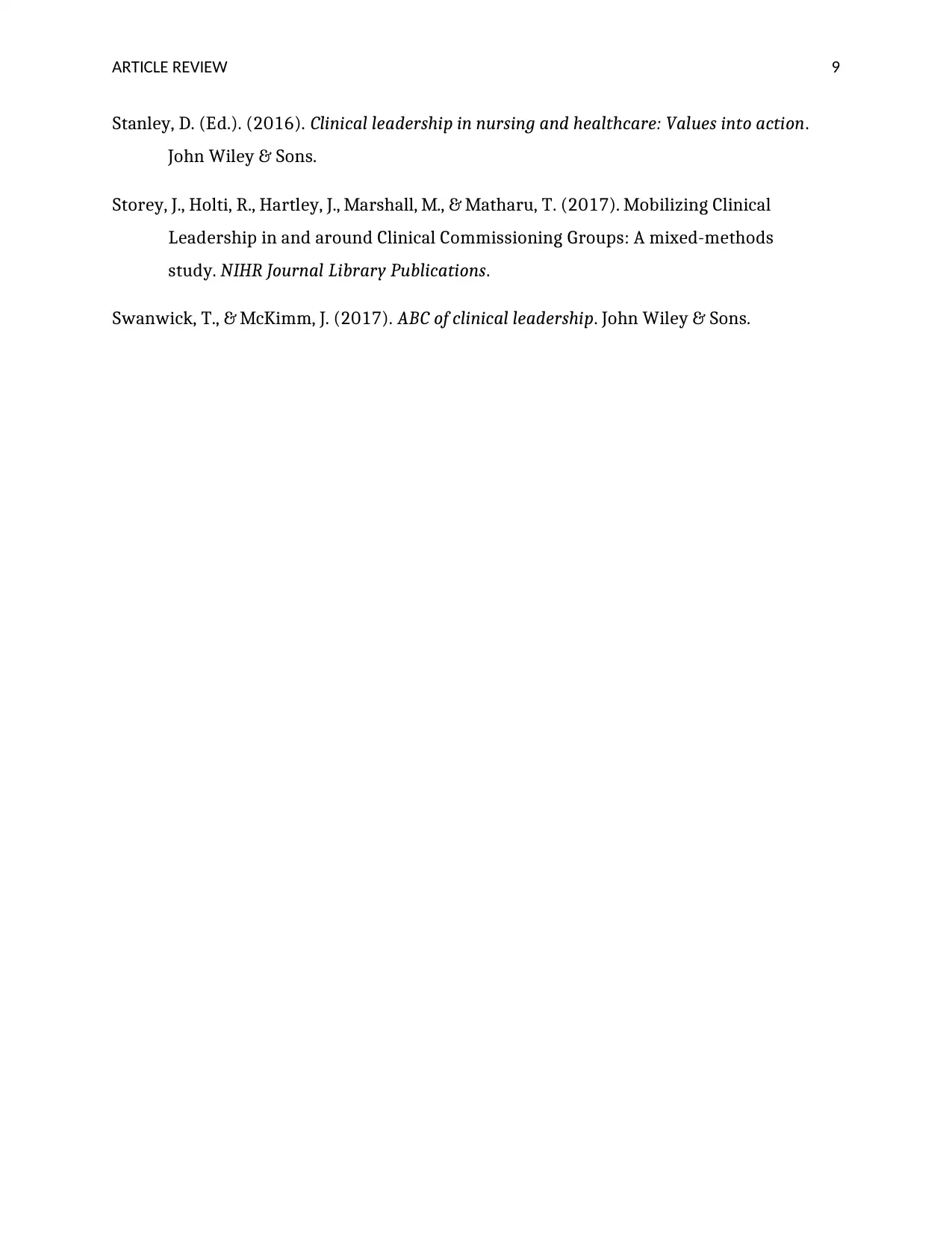
ARTICLE REVIEW 9
Stanley, D. (Ed.). (2016). Clinical leadership in nursing and healthcare: Values into action.
John Wiley & Sons.
Storey, J., Holti, R., Hartley, J., Marshall, M., & Matharu, T. (2017). Mobilizing Clinical
Leadership in and around Clinical Commissioning Groups: A mixed-methods
study. NIHR Journal Library Publications.
Swanwick, T., & McKimm, J. (2017). ABC of clinical leadership. John Wiley & Sons.
Stanley, D. (Ed.). (2016). Clinical leadership in nursing and healthcare: Values into action.
John Wiley & Sons.
Storey, J., Holti, R., Hartley, J., Marshall, M., & Matharu, T. (2017). Mobilizing Clinical
Leadership in and around Clinical Commissioning Groups: A mixed-methods
study. NIHR Journal Library Publications.
Swanwick, T., & McKimm, J. (2017). ABC of clinical leadership. John Wiley & Sons.
1 out of 10
Related Documents
Your All-in-One AI-Powered Toolkit for Academic Success.
+13062052269
info@desklib.com
Available 24*7 on WhatsApp / Email
![[object Object]](/_next/static/media/star-bottom.7253800d.svg)
Unlock your academic potential
Copyright © 2020–2026 A2Z Services. All Rights Reserved. Developed and managed by ZUCOL.




